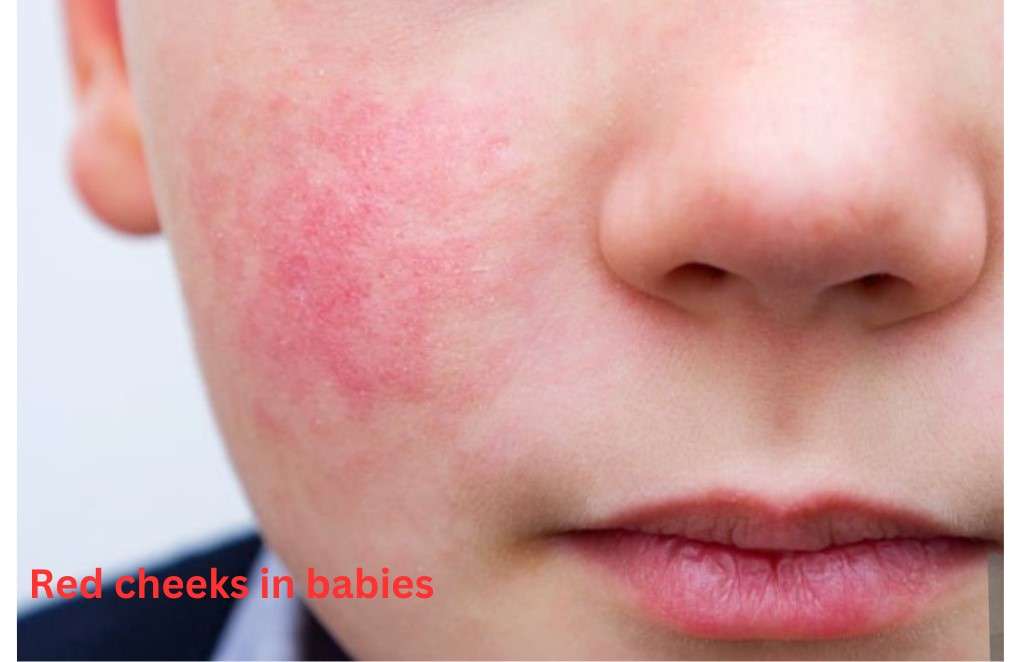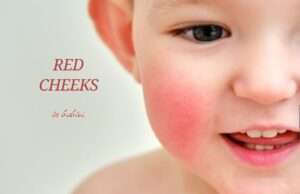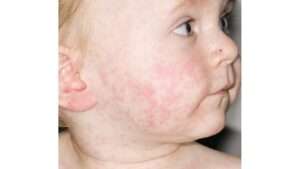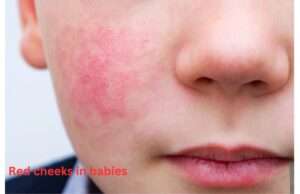Red Cheeks in Babies: Causes, Symptoms, and Treatments
- Dr Owais Rafiq
- October 1, 2024
- 9:33 am

Although your baby’s rosy red cheeks are adorable, you might wonder if something is a missing. Is it something more sinister than a cute teething side effect? From innocent issues like teething or windburn to more serious conditions like Fifth Disease, eczema, and other red-cheek-related disorders here is what may be causing the rosy cheeks: Although some redness clears up with time and a touch of moisturizer, acute or chronic redness can point to an underlying medical issue such as parvovirus B19 infection that has long-term effects and complications when untreated. For you to help your child keep safe and be healthy let’s go over the possible reasons and when you should seek a specialist.
Red cheeks in babies Causes:

Several conditions can cause red cheeks on a baby. Eczema on a child’s cheeks is one of the leading causes of red cheeks. The parents who are undecided whether their child’s red cheeks indicate a condition that may be treated with medicine should consult with a pediatrician. In particular, red cheeks might be caused by;
|
Causes |
| Fever |
| Fifth Disease (Erythema infectiosum) |
|
Teething Rash |
| Eczema |
| Skin Infection (Cellulitis) |
| Food Allergy or Intolerance |
| Heat Rash |
| Diaper Rash Cream or Skincare Product Reaction |
Symptoms, causes and treatments of red cheeks in babies:
Fever
- Underlying Mechanism: Increased body temperature causes facial flushing.
- Symptoms:
- Red cheeks
- Elevated body temperature
- Lethargy
- Irritability
- Sweating
- Additional Notes: Fever could be caused by an infection, vaccination, teething (in babies), heat exhaustion, heatstroke, autoimmune diseases, drugs, drug reactions, or cancers (like leukemia and lymphoma).
- Treatments:
- Keep the child hydrated.
- Take fever control methods, such as paracetamol and ibuprofen.
- Monitor for other symptoms of infection.
Fifth Disease (Erythema Infectiosum)
- Underlying Mechanism: Parvovirus B19ab entering the red cells by the viral infection et underline Mechanism
- Symptoms:
- Red cheek rash (slapped cheek appearance)
- Sometimes no symptoms (in about 20% of children)
- Influenza (tiredness, headache, slight fever)
- Tender throat, runny nose, painful joints
- Additional Notes:
- Can be more serious for individuals with blood disorders.
- Very infectious and transmitted by coughing or sneezing.
- Infection during pregnancy may lead to complications.
- Treatments:
- Medicated, Real care, blood products, and other special treatments.
- Additional consult with an obstetrician every 4 weeks if a mother is diagnosed to be stressed by acute parvovirus during pregnancy.

Teething Rash
- Underlying Mechanism: Physical irritation from drool or baby’s developing teeth.
- Symptoms:
- Red cheeks and chin with rash, mild irritation, and chapping
- Swollen, tender gums
- Fussiness, crying, slightly raised temperature (<100.4°F)
- Drooling, gnawing on hard objects
- Additional Notes: Harmless but may crack and bleed, increasing infection risk. Symptoms vary between babies.
- Treatments:
- Clean drool, apply mild moisturizer.
- Massage the sore gums with a clean finger.
- Use refrigerator-cooled teething toys.
Eczema
- Underlying Mechanism: Inflammatory response is caused by attackers like soaps or foods.
- Symptoms:
- Dry, scaly patches, redness, and inflammation
- Red cheeks
- Severe cases: skin cracking and bleeding
- Additional Notes: Worsens with irritants and allergens, increasing infection risk.
- Treatments:
- To repair the skin barrier, the moisture content should be increased.
- The skin layer can be protected by and applying moisturizers immediately after bathing which helps in keeping the body moist.
Skin Infection (Cellulitis)
- Underlying Mechanism: There is a possible presence of a micro-organism invading the system through a break in the dermal layers or any other wound happening to the skin layer.
- Symptoms:
- Redness, swelling, and tenderness on cheeks
- Warmth to the touch
- Associated fever
- Additional Notes: Often affects one side of the face. Untreated infections can spread and lead to complications.
- Treatments:
- More precisely the topic of infection should be treated with antibiotics.
- There is a fever for which Paracetamol is recommended.
- For the local site of the rash, to relief the itching which anti-histamines are used, as well as using wet cold compresses that provide relief.

Food Allergy or Intolerance
- Underlying Mechanism: This is due to the allergens in the breast milk given to the baby and/or the baby was given a causative meal. Food that was given to the baby caused allergic reactions or the reaction has occurred through breast milk.
- Symptoms:
- Sudden red cheeks
- Swelling, hives, and irritation on cheeks
- There are possible digestive issues such as vomiting and diarrhea
- Additional Notes: Symptoms usually come on after the allergen intake.
- Treatments:
- Eliminate the triggering food.
- Consult a pediatrician.
- Use prescribed antihistamines if necessary.
Heat Rash
- Underlying Mechanism: Blocked sweat ducts trap sweat under the skin in warm environments.
- Symptoms:
- Small red bumps
- Irritation and redness, often on cheeks and neck
- Treatments:
- Keep the child cool, dress in lightweight fabrics, and use cool compresses.
- Avoid heavy creams that block pores.
Diaper Rash Cream or Skincare Product Reaction
- Underlying Mechanism: Allergic reaction to skincare products applied to the face.
- Symptoms:
- Red, inflamed, and irritated skin
- Itching
- Additional Notes: Irritation begins after applying a new cream or ointment.
- Treatments:
- Discontinue the product.
- Clean the area with water.
- Use only moisturizing products without allergens and perfumes.
Dr Owais Rafiq
Subscribe to Dr Owais YouTube channel
For parenting advice, child health, symptoms, causes and treatment of illness in children.





